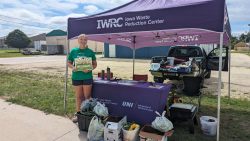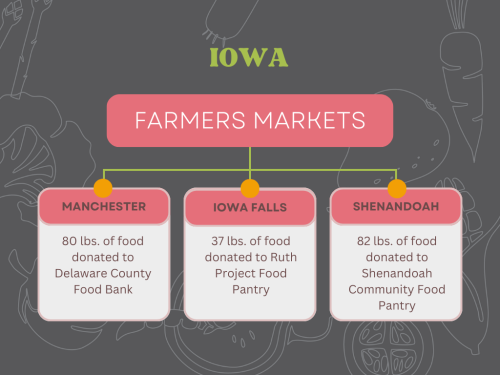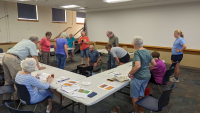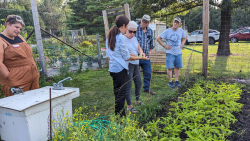Table of Contents
- Farmers Markets
- Compost Training
- Wrap Up
- Special Thanks
The summer is always a busy time for the Iowa Waste Reduction Center’s (IWRC) Food, Beverage & Organics program. This summer was no different. July and August in Iowa marks the height of the farmers market and community garden season so Program Manager, Jennifer Trent, and Environmental Specialist, Jason Clay loaded the car and set forth to visit three Iowa communities, Manchester, Iowa Falls, and Shenandoah to assist them with implementing both food donation and composting strategies as part of the USDA funded Community Gardens and Farmers Market Compost and Donation project. This also served as a fantastic experiential learning opportunity for our environmental interns, Mikayla Gasper and Eliana Hornbuckle as one or both assisted in each collection/donation table and compost workshop.
FARMERS MARKETS
During the farmers markets, the IWRC setup a booth to promote donation of left-over edible foods at the end of the farmers market and provided brochures with step-by-step instructions for developing a food donation program. Brochures are specific to each community and details where the food needs to be dropped off, what is accepted,and contact information.
 A successful food donation program involves both vendors and customers in order to donate, as well as collect and transport leftover food items to the local food pantry or food bank. Prior to each visit, IWRC staff and environmental interns reached out to key stakeholders in each community to identify resources and locations for food donation. An online sign-up sheet was created specific to each location for community members to volunteer to collect and transport donations at the end of their community's farmers market. The IWRC was eager to be the first to sign up. Volunteers are still needed in each community to collect donations and transport them to the local food bank or pantry so make sure to sign up today!
A successful food donation program involves both vendors and customers in order to donate, as well as collect and transport leftover food items to the local food pantry or food bank. Prior to each visit, IWRC staff and environmental interns reached out to key stakeholders in each community to identify resources and locations for food donation. An online sign-up sheet was created specific to each location for community members to volunteer to collect and transport donations at the end of their community's farmers market. The IWRC was eager to be the first to sign up. Volunteers are still needed in each community to collect donations and transport them to the local food bank or pantry so make sure to sign up today!
 COMPOST TRAINING
COMPOST TRAINING
While donating leftover food items is certainly the best option, what do you do with those few rotten vegetables or weeds you’ve pulled from your garden? Community members in each of the three communities had the opportunity to attend a compost training workshop to learn about the importance of selecting feedstocks, carbon to nitrogen ratios, moisture content, temperature, curing, and addressing odors. Attendees got their hands dirty and learned how to gauge the health of their compost pile by conducting simple field exercises such as bulk density, free air space and moisture content.
attend a compost training workshop to learn about the importance of selecting feedstocks, carbon to nitrogen ratios, moisture content, temperature, curing, and addressing odors. Attendees got their hands dirty and learned how to gauge the health of their compost pile by conducting simple field exercises such as bulk density, free air space and moisture content.
As a way to enhance the in-person workshops, three training videos were created and cover the following topics.
- A Beginners Guide to Vermicomposting
- Backyard Compost Training
- Permit-by-Rule for Small Compost Sites
WRAP UP
It was a busy summer but the outcomes were well worth it. Within two months we made new connections in three Iowa communities, collected and donated just short of 200 lbs. of food, and introduced 20 individuals to compost and vermi-composting methods. “This project has been very beneficial for small communities, “ stated Jennifer Trent. “Thank you to each community for hosting us and taking the time to learn and invest in strategies to reduce food waste and improve the quality of life.”
The Community Gardens and Farmers Market Compost and Donation Project was designed to decrease the amount of food headed to the landfill through beneficial and sustainable alternatives. To learn more about the project, visit https://iwrc.uni.edu/food-waste/farmers-market.
SPECIAL THANKS
The IWRC would like to extend a special thanks to the following individuals:
Carrie Falk, Director at Shenandoah Public Library - provided training space, reached out to her network of librarians across Iowa and the IWRC now has three more requests for community compost training.
Jeannine Lijedahl, Shenandoah - coordinated the drop-off of donated produce, provided us with a tour of their food pantry and discussed their other community efforts..
Mary Lou Wolhoy, Farmers Market Coordinator in Shenandoah - provided us with space to collect donations and do outreach at the farmers market.
Jenna Johnson, Shenandoah - provided insights into what training location options would garner the most attendees in the community and connected us with Carrie Falk.
Sara Breckenfelder, Our Savior Lutheran Church in Manchester - has been meeting volunteers at the church where donations are stored until the Delaware County Food Bank is open on Monday to accept the donations.
Doug Foley, Director of Parks & Recreation in Manchester - provided local insights and logistical support to the project.
Jan Conrad - Farmers Market Coordinator in Manchester - provided booth space to collect donations and do outreach at the farmers market.
Tim Broer, Iowa Falls - provided an amazing tour of the Iowa Falls Community Garden.
Sendy Chuong, owner of the local restaurant Chuong Garden in Iowa Falls - explained the unique and unusual produce she grows at the Iowa Falls Community Garden.
Karlie Niedert, Iowa Falls Parks & Rec Director - obtained approval from the Parks & Rec Board to do training at the community gardens.
Danny Blair, Iowa Falls Farmers Market Coordinator - provided table space to collect donations and do outreach at the farmers market.
*This material is based upon work supported under a grant by the Rural Utilities Service, United States Department of Agriculture. Any opinions, findings, and conclusions or recommendations expressed in this material are solely the responsibility of the authors and do not necessarily represent the official views of the Rural Utilities Service.

